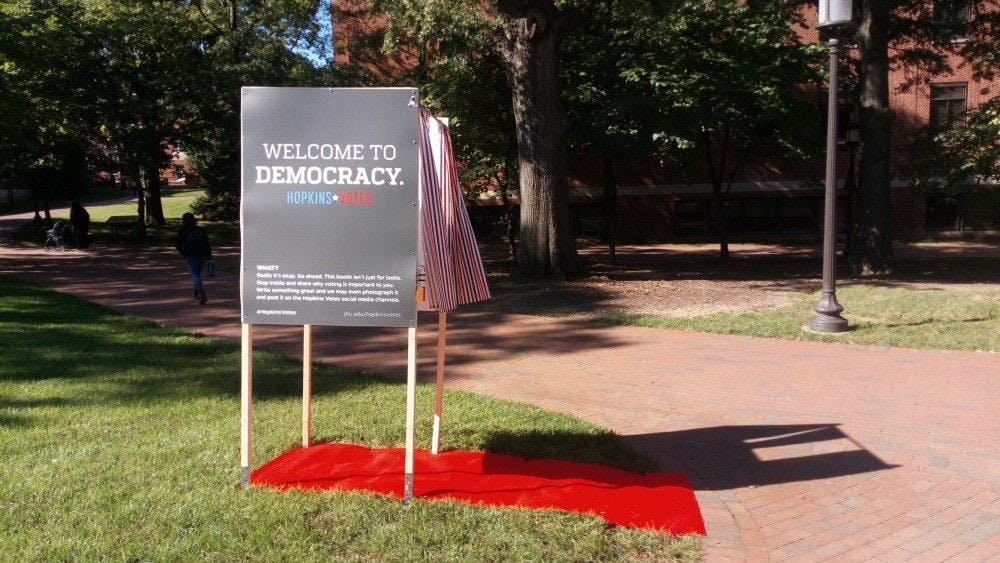Shortly after the 2016 U.S. presidential elections, I was sitting in the FFC when I overheard someone confessing that she didn’t vote. She was unhappy with the election results, and she was registered to vote in a swing state.
“I had way too much stuff to do,” she said.
At the time I was still reeling from the fact that Donald Trump had won, so needless to say, I was angry. As a single voter, she wouldn’t have had much impact. But I felt that she and numerous other irresponsible college-aged voters could have made all the difference if they’d set aside a few minutes to fill out some damn bubbles.
Looking back, however, I empathize. Having a busy schedule shouldn’t be an excuse for not voting. But for students in a college environment like Hopkins, where the work and stress seem to be never-ending and mental health resources are lacking, it is an explanation. Election season is also midterm season, and when you’re jumping from class to class, cranking out a paper and studying for your exams, voting might just seem like another burdensome commitment. Granted, it’s not the most time consuming task, and it shouldn’t be one you dismiss as “optional.” But under high stress, even the smallest tasks may seem overwhelming.
Voter turnout in the U.S. among college students isn’t exactly high. In 2016, 48.3 percent of college students voted. The rates are lower during midterm elections. In 2014, about 18 percent of voters in the undergraduate age range voted. And while polls anticipate that voter turnouts will be higher this year, with 40 percent of 18-29 year olds saying that they will “definitely vote,” that percentage is still less than half. It’s not enough.
There are things we can do at Hopkins to help change this. While voting is ultimately our responsibility and ours alone, that doesn’t mean that Hopkins can’t make an effort to make that responsibility easier. And that effort doesn’t have to stop with TurboVote.
That’s why I propose that Hopkins cancel classes on Election Day.
One might argue that a few classes wouldn’t and shouldn’t make a difference. In 2016, I was able to take a shuttle between my hour-long classes to the Enoch Pratt Free Library and vote. But I had a looser schedule then. Many others did and do not. They have classes and labs and work shifts that go on for hours, with maybe a little break for a quick meal. Their commitments would start early in the morning and end well into the night, and they would be too tired or too busy to vote. Moreover, they might have failed to plan ahead and might not have thought of voting early or absentee.
Even if students could technically set aside some time, many of them would not see it that way. On our most stressful days, we tell ourselves that we don’t even have the time to eat a meal or sleep or take a 10-minute shower, even when we do. On such days, we might also tell ourselves that voting is an impossibility.
Cancelling classes would help change that. The more leisure time we Hopkins students have on Election Day, the likelier it is that more of us will make it to our polling places. It won’t get all of us to vote, but it will probably increase our turnout by some margin.
Calling it a day off on Election Day is certainly not a new idea. Many businesses close their doors or give their employees paid work time to vote. But not that many U.S. colleges do. Hopkins can set an example and give students a day off. In doing so, the University will be sending a message to students that in the end, they must prioritize the future of the nation over their personal commitments.
And it’s not just students, professors, teaching assistants and administrators at Hopkins who should get a day off. Research shows that there is a relatively high voter turnout among salaried professionals. On the other hand, people who work in service and minimum-wage jobs do not have flexible schedules, and their turnouts are low. Giving all of our staff one day off would better ensure that their voices are heard.
Granted, not all of us will use Election Day to fulfill our civic duty and vote. But no matter how marginal the increase in voter turnout among Hopkins affiliates might be, a day off on Election Day will be a way of celebrating our voting rights. And in today’s political climate, it’s more important than ever that we do celebrate those rights. That we do not take our democracy for granted.
Sarah Y. Kim is a junior majoring in Writing Seminars and International Studies from Walnut Creek, Calif. She is the Opinions Editor.

















